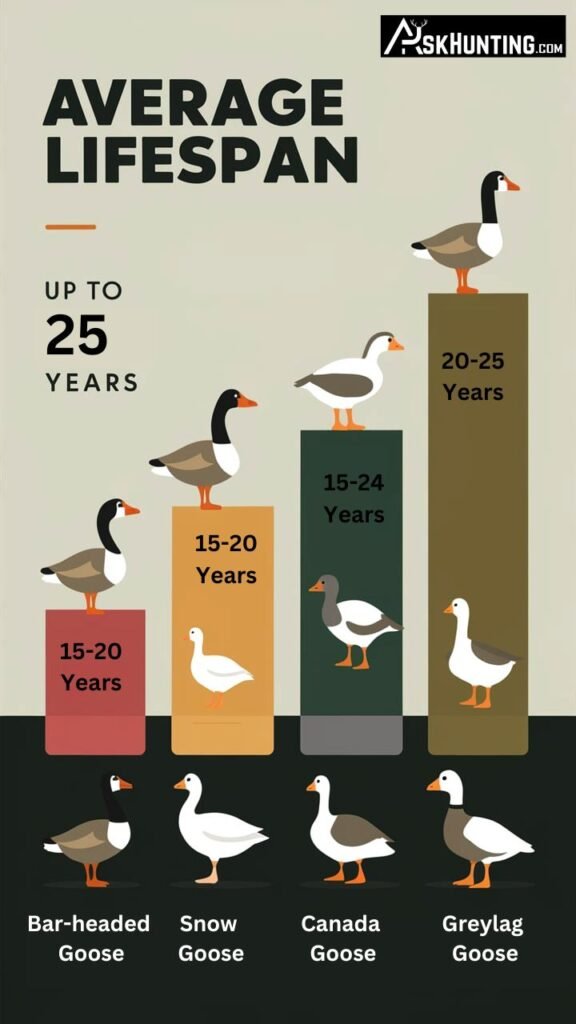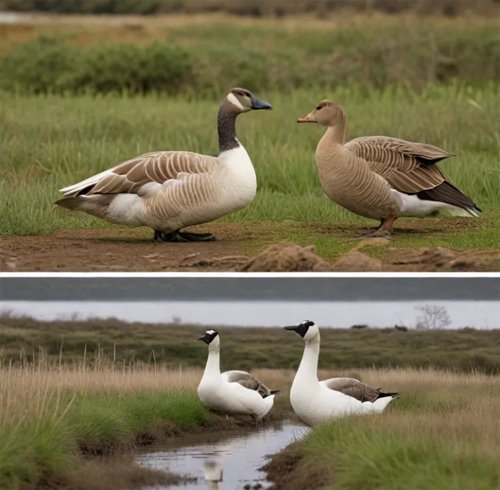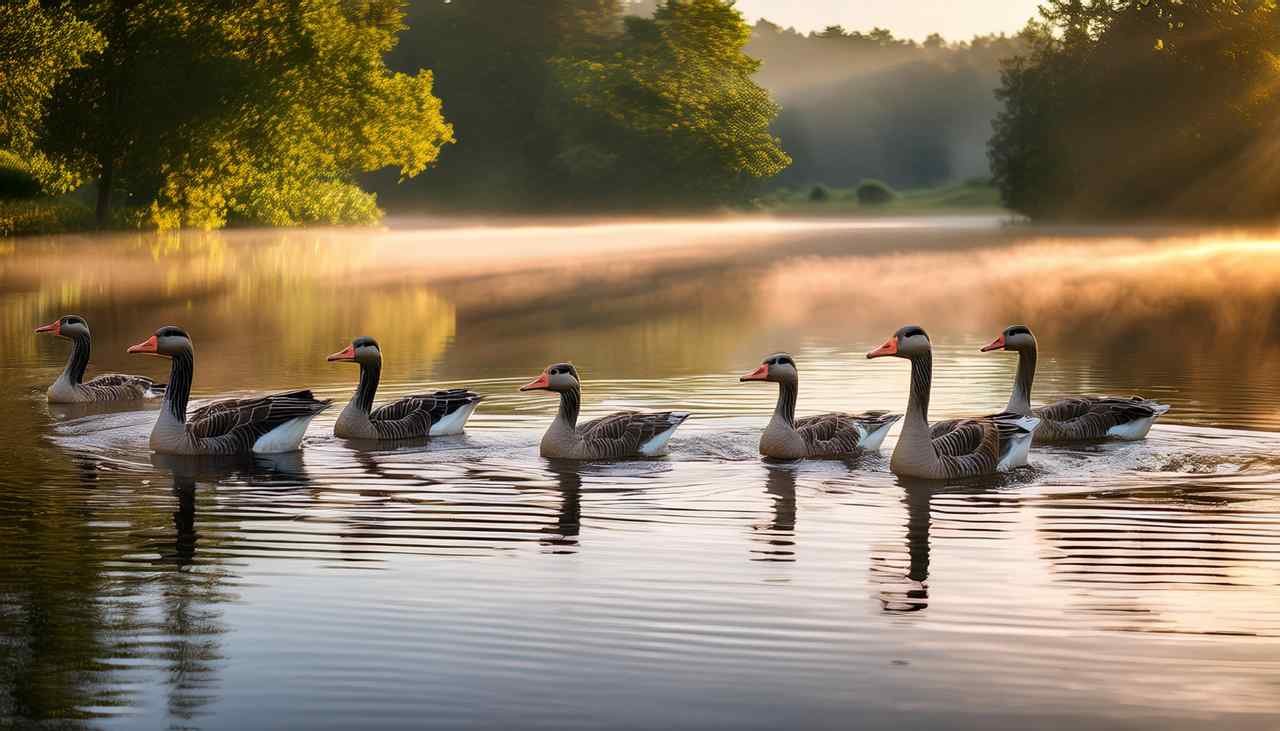Geese, known for their unique honks and V-shaped flight pattern, are interesting animals that have intrigued people for a long time. But apart from their beauty, these birds also raise questions about their lifespan. Just how long do these lovely geese actually live? Join us as we discover more about goose lifespan secrets.
Goose Lifespan: A General Overview
The Average Lifespan
Goose lifespans outdo those of a good number of other birds. Generally, they clock 10 to 24 years of life. Yet, it’s important that we see this as a rough calculation. There are many aspects that can drastically change how long a goose lives. We’re going to dive deeper into this topic.
Species and Their Lifespans
Did you know geese can live from 10 up to 24 years? But not all geese are the same. Here’s a peek at the lifespan of some common species:
- Canada Goose: These are hardy, adaptable birds. In captivity, they’ve been known to live as long as 24 years.
- Snow Goose: These stunning, white geese usually live about 20 years, similar to their Canadian relatives.
- Greylag Goose: As a larger species of them, Greylags can reach 20 to 25 years of age.
- Bar-headed Goose: These geese are famous migrants. They generally have a lifespan of 15 to 20 years.

Comparison of Lifespans
| Goose Species | Average Lifespan (years) | Migration Pattern |
|---|---|---|
| Canada | 15-24 | Short to long-distance migrations |
| Snow | 15-20 | Long-distance migrations |
| Greylag | 20-25 | Resident or short-distance migrations |
| Bar-headed | 15-20 | Extremely long-distance migrations |
Factors Affecting Their Lifespan
- Habitat: Where a goose lives hugely impacts how long it lives. Wetlands, grasslands, and farmlands have good stuff like food and shelter.
- Diet: These birds need to eat a balanced meal with vitamins from plants, bugs, and little water creatures.
- Predators: They have many enemies, like foxes, coyotes, hawks, and owls. These baddies can make geese numbers drop.
- Human Impact: Their lives can get worse because of people. Destroying their places, making them dirty, or hunting them can shrink their numbers and shorten their lives.
| Nutrient | Importance for Geese | Food Sources |
|---|---|---|
| Protein | Muscle growth, feather development | Insects, small fish, aquatic plants |
| Fiber | Digestion, gut health | Grasses, sedges, leaves |
| Vitamins and Minerals | Overall health, immune system | Various plant and animal matter |

Aging: Signs and Challenges
Signs of Aging in Geese
With time, geese undergo noticeable transformations in their appearance and habits. Obvious indicators of geese growing older are:
- Decreased mobility and agility
- Reduced feather quality and appearance
- Slower reaction times
- Changes in vocalization patterns
- Diminished reproductive success
Challenges Faced by Aging Geese
They face different hurdles in their later life stages, affecting their overall well-being and longevity. Such stumbling blocks include:
- Increased susceptibility to diseases and infections
- Difficulty competing for food and resources
- Vulnerability to predators
- Challenges in migration
Common Health Issues Affecting Geese
Common Health Issues Affecting Geese
Geese, like all living things, can get sick. They can face many health problems that affect how long they live.
- Avian influenza: It’s a very contagious virus and can cause a lot of geese to die.
- Botulism: It’s caused by bacteria and harms the nervous system. It can be deadly.
- Lead poisoning: Hunting can leave lead shot in the environment. Geese might eat this and can get very sick or die.
- Parasites: Parasites, both internal and external, can also make geese weaker and shorter-lived.
Preventing Diseases
To keep geese healthy and long-living, it’s key to take steps to prevent these diseases. This includes:
- Giving geese vaccines for avian influenza,
- Lowering the amount of lead in the environment,
- Making sure the water in places where geese live is clean,
- Checking if geese populations show any signs of disease.
How to Help Geese Live Longer
Conservation Efforts and Goose Protection
Keeping goose homes safe, cutting down on pollution, and promoting fair hunting habits are key to making sure these amazing birds are around a long time. It’s also good to back groups who are all about their safety, as another way to help.
Creating a Goose-Friendly Environment
Consider encouraging a positive space for geese if you happen to bump into them. Simple steps like:
- Giving them access to fresh water is a start.
- Offering an assortment of food can help too.
- Keep harmful creatures away from geese.
- Finally, be cautious in their nesting seasons so as not to cause them stress.
The Impact of Migration on Goose Longevity
These species often embark on amazing migration trips, traveling huge miles from where they breed to where they winter. This tough travel can greatly affect their life length.
- Physical Demands: The hard work of migrating can take its toll, especially on the older bunch..
- Environmental Challenges: The geese meet different trials during their migration, like severe weather, loss of habitat, and obstacles made by humans.
- Predation Risks: When geese migrate, they’re easier targets for predators because they group together and are fatigued.
Migration Routes and Corridors
Understanding goose movement is essential for their safety. By highlighting and protecting their crucial routes and resting areas, we can help these remarkable birds live longer.
Social Dynamics and Lifespan
Geese are communal birds, living in intricate societal systems. These connections can impact their life span in many ways.
- Pair Bonding: Numerous types of geese develop durable bonds that could endure years or even life. The companionship from these bonds supports longevity.
- Family Groups: Often, geese reside in family units, with offspring taken care of by parents. Such society boosts survival chances for young ones and can indirectly affect adult life spans.
- Social Stress: Squabbles over territory, resource fights, and bullying in the flock can harm the goose’s wellbeing and reduce its life span.
Conclusion
Knowing how long geese live is key to valuing them and planning ways to keep them safe. If we know what affects their lifespan and work to protect where they live, we can make sure people in the future will still enjoy their unique charm.
Do you have any personal experiences with geese? Talk about your encounters and thoughts below. Let’s build a goose-loving group and gain wisdom from one another!
- New Jersey Outdoors: 2025-2026 Hunting Season Dates and Rules - August 28, 2025
- North Dakota’s Hunting Guide: 2025-2026 Season Dates And Regulations - August 18, 2025
- 2025 Hawaii Hunting Dates and Hotspots - August 18, 2025

